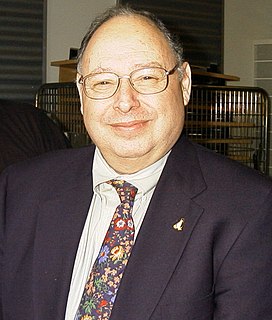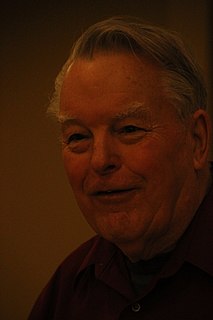Related Research Articles
George Abel Rothrock Jr. was a professor of European history at the University of Alberta, known for his research on the military history of early modern Europe and the Ancien Régime in France, including books on Huguenots and on 17th-century military engineer Sébastien Le Prestre de Vauban, and a translation of de Vauban's work.

Solomon Feferman was an American philosopher and mathematician who worked in mathematical logic.

Peter Henry Salus is a linguist, computer scientist, historian of technology, author in many fields, and an editor of books and journals. He has conducted research in germanistics, language acquisition, and computer languages.
Richard Martin Berthold is an American classical historian, an associate professor emeritus at the University of New Mexico. He is the author of two books on classical history, and is also known for his controversial positions on politics and religion.

Joseph A. Amato is an American author and scholar. Amato was a history professor and university dean of local and regional history. He has written extensively on European intellectual and cultural history, and the history of Southwestern Minnesota. Since retiring, he has continued publishing history books, as well as five poetry collections and his first novel.
Mark A. Raider is an American historian. He is a professor of modern Jewish history at the University of Cincinnati.
Jeffrey A. Barrett is Chancellor's Professor in Logic and Philosophy of Science at the University of California, Irvine. He is known for his work on the measurement problem of quantum mechanics (why and how quantum systems collapse when one measures them), and particularly on the many-worlds interpretation of Hugh Everett.
Hilton Obenzinger is an American novelist, poet, history and criticism writer.

Gurinder Singh Mann is a Punjabi-American scholar and professor of Sikh studies, and the author of multiple books on Sikh religion and society. Mann taught religion at Columbia University from 1988 to 1999 and then held the Kundan Kaur Kapany Chair in Sikh Studies from 1999 to 2015 at the University of California, Santa Barbara. He came under fire for alleged sexual harassment in 2013, retired from Santa Barbara in 2015, and founded the Global Institute for Sikh Studies in New York City, which he presently directs.
Lawrence B. Glickman is an American history professor and author or editor of four books and several articles on consumerism. He has taught at Cornell University since 2014, where he is Stephen and Evalyn Milman Professor in American Studies. Previously he taught at the University of South Carolina. Glickman earned a Princeton University B.A. in history magna cum laude in 1985, a M.A. in 1989 and his Ph.D. in 1992 both from University of California, Berkeley. He has written three books, A Living Wage: American Workers and the Making of Consumer Society, Buying Power: A History of Consumer Activism in America, and Free Enterprise: An American History.
Richard E. Foglesong is an American historian and political scientist who focuses on Florida and U.S. politics, New Urbanism and the politics of urban development, Hispanic politics, and the history of Walt Disney World and the Reedy Creek Improvement District. He is the George and Harriet Cornell Professor of Politics, Emeritus at Rollins College.
Carl Douglas Olds was a New Zealand-born American mathematician specializing in number theory.
Jon C. Teaford is professor emeritus in the History Department at Purdue University. He specializes in American urban history and early on in his career he specialized in legal history.
Sherman Kopald Stein is an American mathematician and an author of mathematics textbooks. He is a professor emeritus at the University of California, Davis. His writings have won the Lester R. Ford Award and the Beckenbach Book Prize.
Anita Burdman Feferman was an American historian of mathematics and biographer, known for her biographies of Jean van Heijenoort and of Alfred Tarski.
Robert Martin Frakes is an American classics scholar. He is the dean of the School of Arts & Humanities at California State University, Bakersfield, where he is also a professor of history. His research concerns "political, legal, and religious history in the later Roman Empire".
Jacqueline Bobo is Chair and Associate Professor of Women's Studies at the University of California, Santa Barbara.
Virginia Ann Clark was an American statistician, professor emeritus of biostatistics at the University of California, Los Angeles, and the coauthor of several books on statistics.
Catherine Lee Westfall is an American historian of science known for her work documenting the history of the United States Department of Energy national laboratories.
Donald Jasper Harris is a Jamaican-American economist and professor emeritus at Stanford University, known for applying post-Keynesian ideas to development economics. He is the father of the 49th and current vice president of the United States, Kamala Harris, as well as of her sister, lawyer and political commentator Maya Harris.
References
- ↑ "Samuel Franklin Frakes (1892-1957) - Find A Grave..." www.findagrave.com.
- ↑ "Frank B. Frakes (1908-1988) - Find A Grave..." www.findagrave.com.
- ↑ California, County Marriages, 1850-1952. "Malcolm S Boylan and Josephine Fountaine, 01 Jun 1918". Index and Images FamilySearch citing p. 187, Los Angeles, California, United States; FHL microfilm 2074202. Church of Jesus Christ of Latter-Day Saints. Retrieved July 8, 2014.
- 1 2 "Library - Santa Barbara City College".
- ↑ "Catherine Rose Davies "Kay" Frakes's Obituary on Santa Barbara News-Press". Santa Barbara News-Press.
- 1 2 3 "Faculty Awards and Honors: Dr. George E. Frakes - Santa Barbara City College". www.sbcc.edu.
- ↑ ”Frakes, George Edward.” Writers Directory 2005. Encyclopedia.com. 5 May. 2018
- ↑ Frakes, George Edward (1970). Laboratory for liberty; the South Carolina legislative committee system, 1719-1776 . Lexington: University Press of Kentucky. ISBN 0813112192. OCLC 138306.
- ↑ "Frakes, George Edward - Dictionary definition of Frakes, George Edward - Encyclopedia.com: FREE online dictionary". www.encyclopedia.com.
- ↑ See Susan B. Andrews and John Creed, eds., Authentic Alaska: Voices of Its Native Authors (Bison Books, 1998), p. 94
- ↑ Jenia Walter, Building Writing Skills the Hands-On Way (Cengage, 2017), p. 476, notes 9, 10, and 11
- ↑ "Retired Faculty and Administrators < Santa Barbara City College". catalog.sbcc.edu.
- ↑ "Frakes, Catherine Rose Kay Davies", Obituaries, Santa Barbara News-Press, December 18, 2016
- ↑ Reviews of Laboratory for Liberty:
- Griffith, Lucille (October 1971), The William and Mary Quarterly, 28 (4): 675–676, doi:10.2307/1922201, JSTOR 1922201
{{citation}}: CS1 maint: untitled periodical (link) - Weir, Robert M. (October 1971), The South Carolina Historical Magazine, 72 (4): 239–240, JSTOR 27567078
{{citation}}: CS1 maint: untitled periodical (link) - Kyte, George W. (November 1971), The Historian, 34 (1): 153–154, JSTOR 24442827
{{citation}}: CS1 maint: untitled periodical (link) - Abbot, W. W. (November 1971), The Journal of Southern History, 37 (4): 625–626, doi:10.2307/2206554, JSTOR 2206554
{{citation}}: CS1 maint: untitled periodical (link) - Clowse, Converse D. (December 1971), The Journal of American History, 58 (3): 716–717, doi:10.2307/1893733, JSTOR 1893733
{{citation}}: CS1 maint: untitled periodical (link) - Rogers, Jr., George C. (January 1972), The Florida Historical Quarterly, 50 (3): 307–308, JSTOR 30145851
{{citation}}: CS1 maint: untitled periodical (link)
- Griffith, Lucille (October 1971), The William and Mary Quarterly, 28 (4): 675–676, doi:10.2307/1922201, JSTOR 1922201
- ↑ Review of Pollution Papers:
- ↑ Review of Minorities in California History: